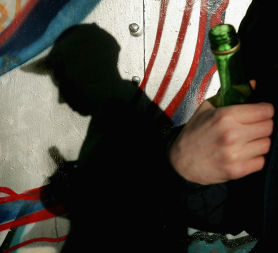Vote 2010: policy guide – social
Updated on 10 April 2010
Anti-social behaviour and crime will be key debating points during the election campaign. Andy Davies writes about the key areas to look out for.

"Who are [the Tories] to declare we're Broken Britain?" Nick Clegg said recently, "How patronising, how pessimistic, how arrogant!"
Both the Liberal Democrats and Labour are quick to dismiss this concept, but for some time now the Conservatives have considered their notion of "Broken Britain" - of societal breakdown and widespread moral decay - a potent electoral theme.
After two young brothers were jailed earlier this year for beating and torturing two other boys in Edlington, South Yorkshire, David Cameron insisted that it was not "an isolated incident of evil" but symptomatic of a wider "social recession".
Labour were quick to dismiss his comments as "unpleasant", but they too have a notable track record in stirring public indignation at this country's supposed "moral vacuums".
It was Tony Blair in 1993 who seized upon the killing of the two year old James Bulger as a "hammer blow struck against the sleeping conscience of the country, urging us to wake up and look unflinchingly at what we see".
The moral health of a nation is not exactly easy to gauge statistically, but certainly in the context of crime alone, public perceptions of an increasingly "broken" society are often at odds with the more objective picture provided by official statistics.
The British crime survey suggests that overall crime has fallen by more than 40 per cent since 1995, with youth reoffending levels at their lowest since 2000, yet a majority of people believe crime is rising nationally.
Trends regarding anti-social behaviour are more difficult to ascertain. Recently the Chief Inspector of Constabulary, Denis O'Connor, lamented the inadequacy of police information regarding anti-social behaviour incidents, but said that in 2008/9 around 3.6 million reports of anti-social behaviour were made (there were 4.6 million crimes reported in the same period).
Expect these figures to feature prominently in Conservative speeches on law and order
L A B O U R
Labour will reiterate its "tough on crime" agenda and attempt to reassert its position as the party which was the "first to legislate" against anti-social behaviour.
So Gordon Brown will talk about "stepping up the fight against those who terrorise our neighbourhoods".
Once again, ASBOs feature strongly in the agenda. There will be pledges to crack down on ASBO breaches and, when it involves someone under 16, new laws to take action against the parents.
'Early intervention' is the current buzz phrase in the field of criminal justice and Labour has promised to expand its family intervention programmes "to cover every problem family in the country by 2014".
On the issue of 'binge drinking' much will be made of a recent decision to ban 'irresponsible promotions' as well as promises to give local communities a greater say in vetoing local 24 hour licensing.
Gordon Brown will want to punctuate his "more-in-prison-for-longer" message with evidence of tougher sentences for gun and knife crime and remind the public of the government's high profile 'orange jacket' community payback scheme - the latest plan involves the public voting on how assets seized from criminals can be distributed to communities.
C O N S E R V A T I V E
Mending Britain's "broken society" needs a big idea, according to David Cameron. The Tory leader's answer is to create what he calls a "big society" to "galvanise social renewal" in which control of some public services would be devolved to voluntary and community groups.
The Conservatives' message will be about shrinking the state to cede more power to communities. The logic: if you give people more responsibility, they behave more responsibly.
Community activism will be given a more formal role under the Tories, with plans to create a 'neighbourhood army' of 5000 full time professional community organisers, an annual national 'Big Society Day' and a voluntary National Citizens Service for all 16 year olds.
There will be a further focus on the party's plans to give tax breaks for married couples and those in civil partnerships.
There will be an emphasis on 'strong and secure families' instilling in children 'an ethic of responsibility from an early age'.
Like Labour there will be much talk of early intervention - with new 'grounding orders' proposed to impose curfews on 'young troublemakers'.
On knife crime the police will be given greater powers of stop and search.
L I B E R A L D E M O C R A T
"Broken Britain is not a phrase we agree with or consider a fair reflection of British society," one Liberal Democrat spokesman told Channel 4 News, but added that Labour's management of the criminal justice system had been "catastrophic".
In particular the Liberal Democrats will talk about the "criminalisation of children" as a "source of national shame".
Recently Nick Clegg said: "We barely hear about the fact that 3000 or 4000 young men go into prison every month...the government has created 'colleges of crime'''.
So the party wants to expand the current Community Justice Panel scheme to every town to deal with minor offences and anti-social behaviour. To this end there will be a greater focus on restorative justice programmes.
Under the Liberal Democrats, there will be fewer ASBOs ("completely overused") and more ABCs (Acceptable Behaviour Contracts - "cheaper more effective").
The party will also seek to give police and local authorities far greater scope for imposing immediate sanctions on young offenders (such as cleaning up graffiti etc). On knife crime the police will be given greater access to hospital data to identify knife crime 'hot spots'.
There will also be an immediate end to the controversial practice of using 'mosquito devices' to emit a powerful high-pitched sound to disperse groups of young people.









